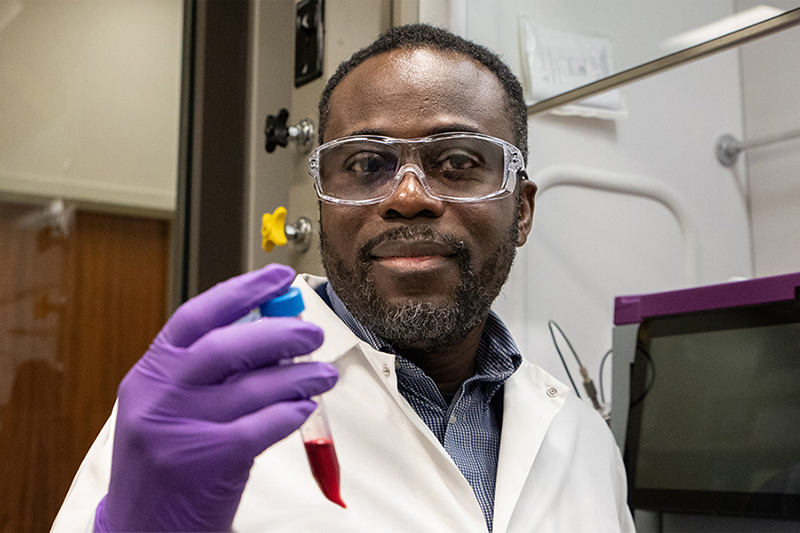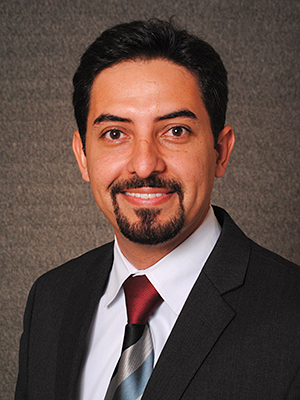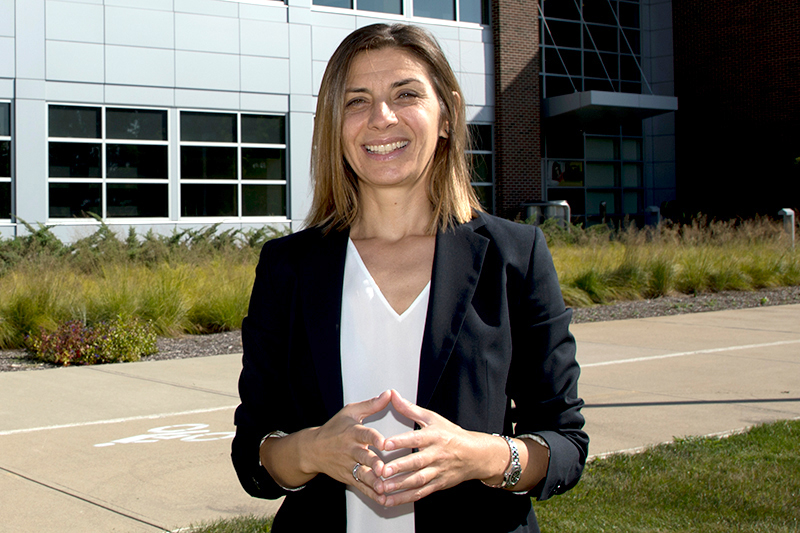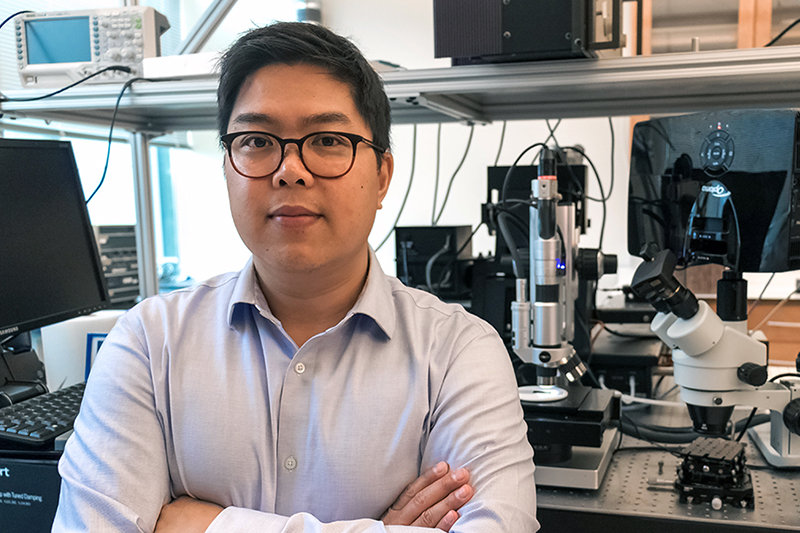January 24, 2024
Purdue Innovates awards Purdue researchers $150K to develop innovations for the marketplace

Herman Sintim, a Purdue University researcher, has identified patent-pending compounds that will be evaluated for reducing the severity of arthritis. Sintim is one of four Purdue researchers who received a total of $150,000 from the Purdue Innovates Incubator’s Trask Innovation Fund to make their innovations more attractive for commercial use. (Purdue University College of Science photo/Alisha Referda)
Funded projects focus on blood clot removal, home energy management, pipeline safety and arthritis treatment
WEST LAFAYETTE, Ind. — Four researchers in Purdue University’s colleges of Engineering and Science, the Purdue Institute for Cancer Research and the Purdue Institute for Drug Discovery have received a total of $150,000 from the Trask Innovation Fund to strengthen the appeal of their patent-pending intellectual property for commercial use.
The fund is managed by the Purdue Innovates Incubator, which provides programming for the Purdue University community to ideate, refine and support their solutions. The fund awards up to $50,000 for short-term projects that enhance the commercial value of Purdue intellectual property.
The application deadline for the next round of funding is Feb. 16. Questions about applications can be submitted to trask@prf.org.
The fall 2023 Trask Innovation Fund recipients, their projects and award amounts are:
 Mohammad Reza Jahanshahi, a Purdue University researcher, has developed a patent-pending, advanced computer vision system to autonomously detect defects in pipelines, especially in the oil and gas industry. (Purdue University photo/Lyles School of Industrial Engineering)
Download image
Mohammad Reza Jahanshahi, a Purdue University researcher, has developed a patent-pending, advanced computer vision system to autonomously detect defects in pipelines, especially in the oil and gas industry. (Purdue University photo/Lyles School of Industrial Engineering)
Download image
Mohammad Reza Jahanshahi, College of Engineering, “Autonomous Crack Assessment Software,” $25,000.
Jahanshahi, an associate professor in the Lyles School of Civil Engineering, has developed a patent-pending, advanced computer vision system to autonomously detect defects in pipelines, especially in the oil and gas industry.
“The primary goal of this system is to enhance pipeline safety by providing accurate detection of structural defects and anomalies,” Jahanshahi said. “Additionally, it aims to reduce operational costs and environmental risks by minimizing the need for manual inspections and enabling more efficient maintenance strategies.”
Jahanshahi said the system marks a significant leap in ensuring pipeline integrity and safety.
“Our innovative system utilizes cutting-edge, machine learning algorithms and deep learning techniques to analyze X-ray images with unprecedented accuracy and speed,” Jahanshahi said. “By leveraging sophisticated image-processing methods, the system can identify even the most subtle anomalies and defects that are often undetectable by traditional inspection methods.”
Jahanshahi said integration of the technology into regular maintenance protocols allows for monitoring and early detection of potential issues, drastically reducing the risk of leaks, ruptures and environmental hazards. He said its autonomous nature minimizes the need for human intervention, increasing efficiency and reducing operational costs.
“This system not only promises to revolutionize the way pipeline integrity is managed in the oil and gas sector but also sets a new standard for safety and environmental responsibility in the industry,” Jahanshahi said. “The Trask funding allows us to enhance the algorithm to detect defects in X-ray images of pipelines through a rigorous training and testing process where thousands of X-ray images will be utilized to this end.”
 Researcher Panagiota Karava leads a team of Purdue University faculty that has created MySmartE, a patent-pending IoT software platform that incentivizes people to use energy-efficiency programs developed by government and industry. (Image provided)
Download image
Researcher Panagiota Karava leads a team of Purdue University faculty that has created MySmartE, a patent-pending IoT software platform that incentivizes people to use energy-efficiency programs developed by government and industry. (Image provided)
Download image
Panagiota Karava, College of Engineering, “MySmartE — An Eco-feedback and Gaming Platform for Home Energy Management,” $25,000.
Karava, a professor in the Lyles School of Civil Engineering, leads a multidisciplinary research team from the College of Engineering, College of Liberal Arts, Mitchell E. Daniels, Jr. School of Business and Purdue Polytechnic Institute that created patent-pending MySmartE, an eco-feedback and gaming system for residential energy management.
“MySmartE addresses the need to effectively deploy energy-efficiency and decarbonization programs in residential communities that would result in measurable, transferable and sustainable outcomes,” Karava said. “This is accomplished by actively engaging and incentivizing residents in understanding and reducing their home energy use.”
MySmartE achieved more than 80% residential engagement and 30% energy-use reduction when deployed in more than 130 households across the Indiana cities of Indianapolis, Fort Wayne, South Bend and New Albany.
Karava said the scope of the Trask-funded project will be to expand the MySmartE user map to include a management portal with dashboard features.
“The team is already engaging with partners, and the end goal of the project is for MySmartE to become a complete product ready for commercialization,” Karava said.
 Hyowon Lee, a Purdue University researcher, has developed a patent-pending, novel clot-retrieving platform called Thrombectomy Retraction Aspiration Platform, or TRAP. (Purdue University photo/Vincent Walter)
Download image
Hyowon Lee, a Purdue University researcher, has developed a patent-pending, novel clot-retrieving platform called Thrombectomy Retraction Aspiration Platform, or TRAP. (Purdue University photo/Vincent Walter)
Download image
Hyowon Lee, College of Engineering, “Development of Thrombectomy Retraction Aspiration Platform (TRAP),” $50,000.
Stroke is the second-leading cause of death around the globe; it kills about 140,000 Americans annually. Almost 90% of stroke cases are caused by an obstruction of one of the arteries that supplies blood to the brain. Swiftly reestablishing blood flow is imperative to preserve neurological function. The current gold standard to remove an obstruction is a catheter with a self-expanding stent that acts like a rake. This method has a high risk of damaging thinner arterial walls.
Lee, an associate professor in the Weldon School of Biomedical Engineering and director of the Center for Implantable Devices, has worked with postdoctoral researcher Ángel EnrÍquez and clinical partners at Goodman Campbell Brain and Spine and NYU Langone Health to develop a patent-pending, novel clot-retrieving platform called Thrombectomy Retraction Aspiration Platform, or TRAP.
“The TRAP catheter integrates biomimetic design into the aspiration catheter tip to enhance forces to remove the obstruction and prioritizes safety,” Lee said. “The design demonstrated a greater than 200% increase in occlusion removal force compared to a traditional catheter. We believe our simple, nature-inspired approach to this problem will disrupt the field of stroke treatment.”
Lee, in partnership with a new startup, Emboa Medical, will use the Trask funding to establish a manufacturing process to integrate microscale structures into the distal tip of catheters. They will conduct in vitro experiments to quantitatively demonstrate the advantages of TRAP catheters in increasing the effectiveness of extracting blood clots.
“The successful completion of these aims planned in this project will lead to early prototypes that can facilitate the transition to larger-scale verification activities toward regulatory approval,” Lee said.
Herman Sintim, College of Science, Purdue Institute for Cancer Research and Purdue Institute for Drug Development, “New Agents for Potential Treatment of Arthritis,” $50,000.
According to the National Health Interview Survey, from 2019-21 more than 53 million Americans were diagnosed with some form of arthritis, fibromyalgia, gout, lupus or rheumatoid arthritis. This includes 26% of adults aged 45-64 and more than 47% of adults 65 or older.
Sintim, the Richard B. Wetherill Professor of Chemistry and Drug Discovery and Distinguished Professor in Chemistry in the Department of Chemistry, said protein kinases play various important roles in a cell. Protein kinases are enzymes that add phosphates to other proteins, which changes those proteins’ cellular location, enzyme activity or association with other proteins. He said kinases are potential targets for arthritis treatment.
“My colleagues and I have identified orally bioavailable compounds that inhibit key kinases that play crucial roles in the progression of inflammatory arthritis,” Sintim said. “The Trask funding will facilitate the evaluation of these compounds in reducing the severity of arthritis in an animal model of rheumatoid arthritis. Such animal studies are needed before a drug candidate can be evaluated in humans.”
Sintim’s compounds are patent-pending.
The impact of Trask funding: Crossing the ‘valley of death’
Matt Dressler, Purdue Innovates Incubator’s fund manager, said the Trask Innovation Fund supports researchers between the time of innovation creation and marketplace adoption, known as the “valley of death.”
“It can take years for an innovative idea to advance far enough to garner industry attention. There are many challenges to overcome during this time, including technology obsolescence and an innovator feeling dispirited by a lack of progress,” Dressler said. “The Trask Innovation Fund can address these challenges by providing faculty with focused funds to translate a research discovery toward a viable product solution. It complements several other resources Purdue Innovates provides to university inventors and entrepreneurs.”
Abhijit Karve, the Purdue Innovates Office of Technology Commercialization’s director of business development, said Trask awards have been used several ways by recipients.
“Awardees have used the funding to support students, conduct tests, generate data and develop prototypes,” Karve said. “This additional level of validation of the research makes it more attractive to companies that want to license it and bring it to the marketplace.”
Between the 2013 and 2023 fiscal years, around $3 million in Trask funding has been awarded to 81 projects. Forty percent of the technologies that have received Trask funding have been licensed or optioned to industry.
These and other innovations created by Purdue researchers across all academic disciplines and campuses are available for further development and licensing. Contact the Purdue Innovates Office of Technology Commercialization at otcip@prf.org for more information.
About Purdue Innovates Incubator
The Purdue Innovates Incubator is the front door to the rich ecosystem of programs and services designed to help early-stage startups take their next step. Programs provide settings for cohort work and one- on-one consultations with entrepreneurs-in-residence. Content includes clarifying problems from the customer’s perspective, developing a business model, conducting customer discovery interviews, team building, determining regulatory pathways and legal structures, and more. Purdue alumni and community members interested in becoming mentors are invited to contact the Incubator team.
About Purdue University
Purdue University is a public research institution with excellence at scale. Ranked among top 10 public universities and with two colleges in the top four in the United States, Purdue discovers and disseminates knowledge with a quality and at a scale second to none. More than 105,000 students study at Purdue across modalities and locations, with 50,000 in person on the West Lafayette campus. Committed to affordability and accessibility, Purdue’s main campus has frozen tuition 13 years in a row. See how Purdue never stops in the persistent pursuit of the next giant leap, including its first comprehensive urban campus in Indianapolis, the new Mitchell E. Daniels, Jr. School of Business, and Purdue Computes, at https://www.purdue.edu/president/strategic-initiatives.
Writer/Media contact: Steve Martin, sgmartin@prf.org
Sources: Matt Dressler, mrdressler@prf.org
Abhi Karve, aakarve@prf.org

